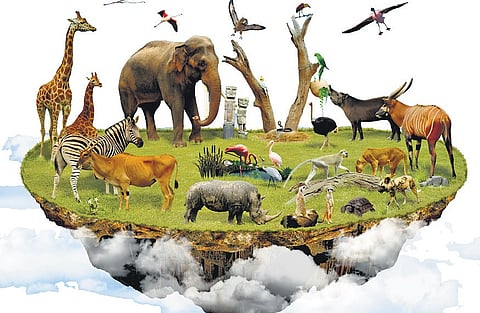

CHENNAI: 2024 has been a year of extremes. Global warming surpassed 1.5 degrees Celsius for the first time on record, a critical threshold if breached continuously will push the limits of life on Earth to adapt. The United Nations University in Bonn said nearly one million species are currently at risk of extinction and natural ecosystems are crumbling.
The latest science says these two are deeply interconnected and warns that tackling them in isolation is ineffective and often counterproductive.
The Intergovernmental Science-Policy Platform on Biodiversity and Ecosystem Services (IPBES) has released a new landmark report called “Nexus Report”, a product of three years of work by 165 leading international experts from 57 countries from all regions of the world.
The report categorically says existing actions to address these challenges fail to tackle the complexity of interlinked problems and result in inconsistent governance.
“These issues are not standalone; they cascade and compound each other,” said Prof Paula Harrison, co-chair of the report. “Without integrated action, we risk making matters worse.”
The report examines five key crises—climate change, biodiversity loss, food insecurity, water scarcity, and health risks—and illustrates how these issues amplify one another. For example, efforts to boost food production often strain land and water resources, undermining biodiversity and exacerbating climate change. Similarly, initiatives to mitigate climate change through land-based carbon sequestration can reduce the availability of arable land, worsening food insecurity. “We must move beyond siloed approaches,” said Prof Pamela McElwee, another co-chair. “Integrated solutions are essential to address these systemic issues effectively.”
The report highlights that more than half of global gross domestic product – more than $50 trillion of annual economic activity around the world – is moderately to highly dependent on nature. “But current decision-making has prioritised short-term financial returns while ignoring costs to nature. It is estimated that the unaccounted-for costs of current approaches to economic activity – reflecting impacts on biodiversity, water, health and climate change, including from food production – are at least $10-25 trillion per year.
The existence of such unaccounted-for costs, alongside direct public subsidies to economic activities that have negative impacts on biodiversity (approx $1.7 trillion per year), enhances private financial incentives to invest in economic activities that cause direct damage to nature (approx $5.3 trillion per year), in spite of growing evidence of biophysical risks to economic progress and financial stability.
Delaying the action needed to meet policy goals will also increase the costs of delivering it. Delayed action on biodiversity goals, for example, could as much as double costs – also increasing the probability of irreplaceable losses such as species extinctions. Delayed action on climate change adds at least $500 billion per year in additional costs for meeting policy targets.
“The true costs of these activities are hidden,” explained Purnamita Dasgupta, an environmental economist and lead author of the report. “If we account for the damages caused by biodiversity loss, ecosystem degradation, and pollution, we see just how unsustainable these practices are.”
“We are quite literally eroding the foundation of our own survival,” warned Dr Anne Larigauderie, Executive Secretary of IPBES.
The report also talks about unequal impacts of global crises, stressing the need for inclusive decision-making to address interconnected challenges in biodiversity, water, food, health, and climate change. Estimates show more than half the global population lives in areas facing the highest impacts of biodiversity loss, declining water quality, food insecurity, and increased health risks. These challenges disproportionately affect developing nations, small island states, indigenous people, and vulnerable communities in higher-income countries. 41% of the global population experienced significant biodiversity decline, while 9% faced severe health burdens, and 5% suffered high levels of malnutrition.
Continuing “business-as-usual” trends will result in worsening outcomes. The report outlined more than 70 response options, taken together would support the achievement of all 17 SDGs, all 23 targets of the Kunming-Montreal Global Biodiversity Framework and the long-term goals for climate change mitigation and adaptation of the Paris Agreement. Twenty four of the response options advance more than five SDGs and more than five of the Global Biodiversity Framework targets. These include ecosystem restoration, sustainable diets, urban nature-based solutions, and integrated landscape management. Restoring forests, mangroves, and carbon-rich ecosystems can simultaneously address biodiversity loss, climate mitigation and food security. Supporting Indigenous food systems and promoting integrated governance also enhance outcomes and equity.
“Some good examples include marine protected areas that have included communities in management and decision-making,” said Prof McElwee. “These have led to increases in biodiversity, greater abundance of fish to feed people and improved incomes for local communities and often increased tourism revenues as well.”
Explaining what is needed, Prof McElwee said the current governance structures and approaches are not responsive enough to meet the interconnected challenges that result from the accelerated speed and scale of environmental change and rising inequalities. This can be addressed by moving towards ‘nexus governance approaches’: more integrated, inclusive, equitable, coordinated and adaptive approaches.the White House late on Thursday, fuelling speculation about a potential White House “emergency”. That Kamala Harris too cancelled her plans to travel to Los Angeles added to the intrigue. The White House has not issued any statements, but some analysts have linked the president’s return to Washington to the looming US govt shutdown.